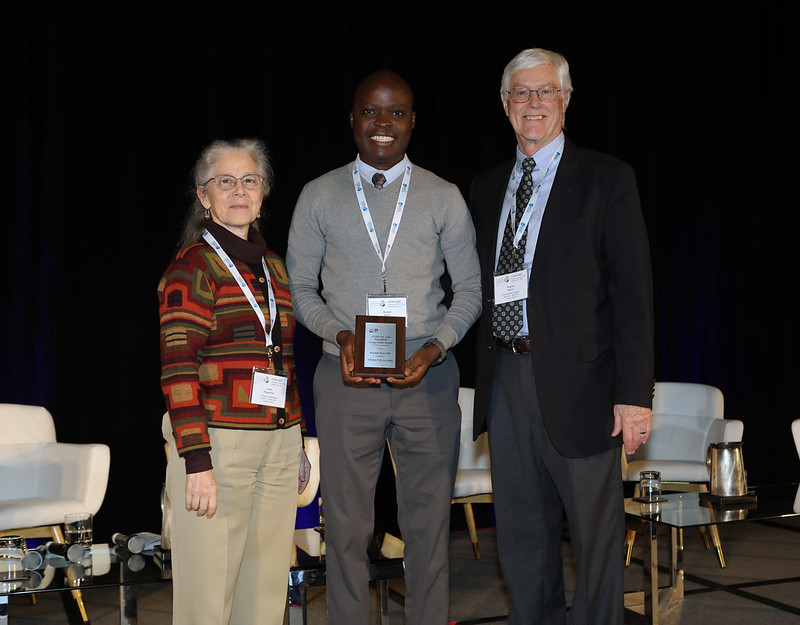Two Research Associates from Makerere University School of Public Health (MakSPH), Dr. Solomon Wafula and Dr. Ronald Olum, have been honoured for their exceptional contribution to global health in this year’s Consortium of Universities for Global Health (CUGH) Awards, held at the recent 16th CUGH Annual Conference in Atlanta, Georgia, U.S., between February 20–23, 2025.
Founded in 2008, CUGH is a Washington, D.C.-based global network of over 190 academic institutions and organizations dedicated to addressing global health challenges through education, research, service, and advocacy. Its core purpose is to position universities as a transformative force for advancing global health, including recognizing outstanding researchers who are making major strides to improve society.
Such recognitions happen through the Consortium’s global health leadership awards, presented annually to distinguished scientists. This year, the ceremony, held in Atlanta, was co-hosted by three universities: Alabama at Birmingham School of Public Health, Georgia College of Public Health, and Emory Global Health Institute, under the theme “Innovating and Implementing in Global Health for a Sustainable Future”.
The competition received numerous nominations for the different award categories through the Consortium’s Nominations & Awards Committee, out of which 36 global recipients were selected. This number includes the two early career researchers from Makerere University School of Public Health.
Dr. Solomon Wafula received the Dr. Anvar and Pari Velji Young African Leader Award, a recognition reserved for outstanding leaders under 35 born and working in Africa and committed to improving lives in low-income settings. Meanwhile, his MakSPH counterpart, Dr. Ronald Olum, a second-time CUGH awardee, received the 2025 Dr. Judy Wasserheit Young Leader Award, following last year’s Velji Young African Leader Award that this year went to Dr. Wafula.
A visibly excited Wafula, undeterred by his inability to attend the ceremony in person due to visa delays and who will now receive the award by shipment to Uganda, expressed delight at the prestigious honour. He described it as a great start to the year and a timely boost to renew his energy to contribute to global health and cause impact.
“It is an honour to be acknowledged alongside remarkable leaders in global health, and this recognition has motivated me and reaffirmed my commitment to contributing to addressing pressing health challenges and contributing to a healthier, more equitable future. The award also gives me another challenge to aspire for bigger initiatives that impact communities. I believe this is only a catalyst,” Wafula affirmed.
The global health leadership award came just in time, following Wafula’s two-month-old PhD, which he was just recently awarded by the University of Hamburg in Germany in February this year. It adds to a growing list of academic credentials that include a Master of Science in Epidemiology with Great Distinction from the University of Antwerp in Belgium, a Master of Public Health with Merit from the University of Manchester in the UK, and a first-class degree in Environmental Health Sciences, our only undergraduate programme at MakSPH, which he attained in 2016.
Wafula thanked different mentors, peers, and colleagues who have worked with him towards this achievement, committing to applying his knowledge and skills to improving lives. “Important achievements come from working with others,” he said, noting, “At this stage in my career, this recognition signifies not only encouragement but also a reminder of the responsibility to continue driving impactful and sustainable solutions in population health. I will use this as a stepping stone to dream bigger.”
Wafula now has over a decade of experience in public health research, project coordination, and academic teaching. His work as a researcher has mainly been around environmental health, tropical disease epidemiology, community health disparities, and maternal and child health. Some of his notable contributions, up to this time, include authoring over 65 peer-reviewed publications, presenting at more than 16 conferences, and securing over USD 36,821 in research grants.
As an academic, Wafula, who has been a Research Associate at MakSPH’s Department of Disease Control and Environmental Health since January 2020, has also successfully supervised more than nine undergraduate and four postgraduate students, ensuring their timely completion and publication of research papers. He also led the design of tools and frameworks under the Centre of Excellence for Sustainable Health (CESH), widely used by researchers, practitioners, and students to advance the Sustainable Development Goals (SDGs), ahead of the 2030 deadline.
On the other hand, in his acceptance speech at the award ceremony in Atlanta on 22nd February 2025, Olum said the award is more of a challenge than a celebration, as it pushes him to continue advocating for equity and amplifying the voices of marginalized young people. “I see this award as a challenge, more than an acknowledgement of excellence, a call to continue striving for equity, especially for marginalized young people in sub-Saharan Africa,” he said.
Adding: “This recognition is particularly meaningful to me because it honours Professor Judith Wasserheit, a globally renowned leader in HIV, sexually transmitted infections, and implementation research. Her work has paved the way for many of us committed to global health. I want to use this opportunity to rally all young people to step up, act, and be relentless in driving change. Our voices, our ideas, and our commitment are essential in building a more just and equitable world. Let’s continue to challenge barriers, amplify marginalized voices, and create lasting impact.”
Olum dedicated the award to the adolescent girls and young women in Northern Uganda whose resilience and strength amidst great adversity, he said, inspires him. Olum was born in the North as an internally displaced person during Joseph Kony’s LRA insurgency. However, he beat the odds to reverse destiny, graduating from Makerere University Medical School in 2022 and going on to earn a Master of Public Health with Distinction from the Imperial College London, UK, in 2024.
He is currently engaged in research around infectious disease epidemiology, implementation science, and global health, specifically focusing on HIV, tuberculosis, and emerging and re-emerging diseases. To date, Olum has authored over 80 peer-reviewed publications and is currently looking at HIV prevention and care for adolescent girls and young women in the post-conflict region of Northern Uganda. He is also currently an HIV Implementation Science Fellow at the Mid-Atlantic CFAR Consortium Implementation Science Hub at Johns Hopkins University, U.S., and he is a former National Institutes of Health (NIH) Fogarty Global Health Training Fellow through the ACHIEVE Consortium at Makerere and Washington University.
Beyond research, Dr. Olum also serves on the World Health Organization’s (WHO) Global Action for Measurement of Adolescent Health (GAMA) Advisory Group and the Lancet Global Health International Advisory Board. He has been a guest editor for the Journal of Adolescent Health, an external reviewer for the WHO Hospital Care Pocket Handbook for the European Region, and a technical advisory group member for UNESCO’s Global Status Report on School Health and Nutrition. He also contributed to the Lancet Global Health Commission on Medical Oxygen Security.




